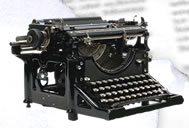Here is a World War I article that appeared on the pages of
The New York Times some four months after the American entry into the war and it reported that the U.S. Government was obligated to close all news and opinion organs that questioned any efforts to prosecute the war or support the allied nations. The
Times reported that the government was granted this power under "Title 1, section 1, 2, and 3 of Title 12 of the Espionage Act" (signed by President Wilson on June 13, 1917). Although no publications were named, the reader will be able to recognize that the only ones slandered as "pro-German" were those that would appeal to the pro-labor readers.
To learn how many African-Americans served in the W.W. I American Army, click here.
Seven and a half months before the second installment of the War-to-End-All-Wars was to begin, George Creel (1876 - 1953), America's first official censor from World War I, wrote this article for the editors of
Collier's Magazine explaining why he believed that censorship in an open society cannot work:
"As many scars bear witness, I was the official censor during the World War. For two years I rode herd on the press, trying to enforce the concealment demanded by the Army and Navy."
The post war period was the time when the press had to start figuring out what was true and what was false in all matters involving the reports that their assorted papers and magazines had printed during the conflict. Admiral Sims of the U.S. Navy caused a stir when he went on record announcing that a particularly odious policy observed by the Germans, widely believed to have been true, was in fact, a falsehood:
"I stated...that barring the case of the hospital ship "Llandovery Castle" I did not know of any case where a German submarine commander had fired upon the boats of a torpedoed vessel..."
Buried on page eight of a post-war issue of
The Stars & Stripes was this column reporting on the wartime activities of the AEF censors in France - men assigned to not simply censor all outgoing mail from Europe, but to also chemically test each one for traces of invisible ink.
Click here to read an article the post office censorship duing the Second World War.
